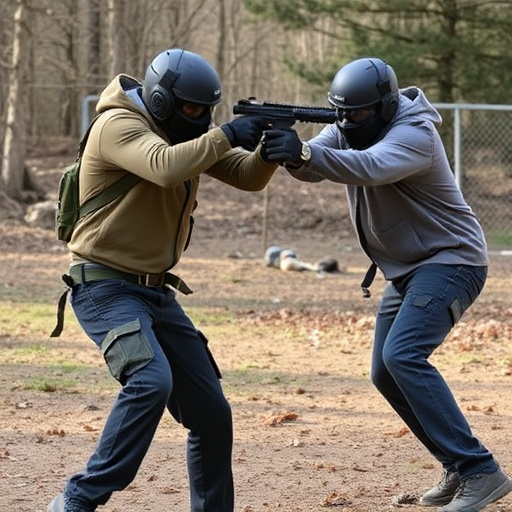In the field of professional security, stun guns are vital non-lethal weapons for guards, offering an essential alternative to lethal force in high-risk scenarios. Certified security guards are invaluable assets due to their proficiency in both device operation and understanding de-escalation techniques, legal boundaries, and safety practices. Training institutions equip students with comprehensive knowledge through practical demonstrations and hands-on practice, focusing on range, power, and deployment. This enables security professionals to responsibly use stun guns in diverse situations, enhancing public safety and contributing to safer communities. Incorporating non-lethal weapon training brings significant advantages for agencies, while navigating legal aspects ensures guards can effectively deploy stun guns as a last resort, maintaining public trust and avoiding legal disputes.
“In today’s dynamic security landscape, equipping guards with non-lethal weapons like stun guns is becoming increasingly prevalent. This article explores the comprehensive guide to non-lethal weapon training certification for professional security guards. We delve into the significance of understanding these tools from a seasoned perspective, examining their role in enhancing security measures.
From certification requirements and specialized training programs to legal considerations, this resource ensures guards and agencies alike are prepared and compliant.”
- Understanding Non-Lethal Weapons: A Professional's Perspective
- The Role of Stun Guns in Security: Certification Requirements
- Training Programs: Preparing Guards for Real-World Scenarios
- Benefits and Considerations for Security Guard Agencies
- Legal Aspects: Navigating Regulations for Non-Lethal Weapon Certification
Understanding Non-Lethal Weapons: A Professional's Perspective
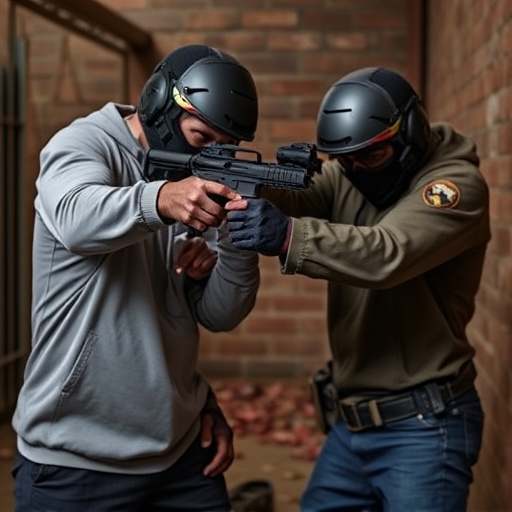
In the realm of professional security, understanding non-lethal weapons is paramount for guards equipped with tools like stun guns. These devices, often referred to as electroshock weapons, offer a crucial alternative to lethal force in high-risk situations. From the perspective of a seasoned security guard, proficiency with a stun gun involves not just physical handling but also a deep grasp of de-escalation techniques and legal implications.
A professional security guard’s interaction with non-lethal weapons like stun guns demands a delicate balance. They must be adept at assessing threats while adhering to strict protocols to ensure public safety and avoid unnecessary escalation. Certification in non-lethal weapon training equips guards with the knowledge and skills necessary to deploy these tools effectively, making them valuable assets in modern security operations where de-escalation and minimal force are key objectives.
The Role of Stun Guns in Security: Certification Requirements
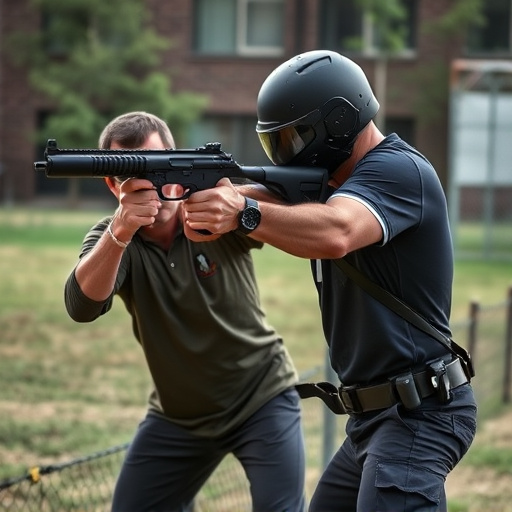
In the realm of professional security, stun guns have emerged as a non-lethal yet powerful tool for guards to enhance their ability to protect and deter potential threats. These devices are designed to temporarily incapacitate individuals, providing critical time for backup or intervention. Certification in using stun guns is not just about learning how to operate the device; it involves understanding when and where these weapons are legally permitted, as well as mastering safe handling practices to prevent accidental discharge.
Security guard training institutions that offer stun gun certification ensure their students gain comprehensive knowledge of the tool’s functionality, safety measures, and legal considerations. This includes practical demonstrations and hands-on practice sessions to familiarize themselves with the stun gun’s range, power settings, and deployment techniques. Upon completion of such training, professionals in the security sector are better equipped to deploy stun guns effectively and responsibly, making them valuable assets in maintaining public safety, especially in high-risk environments where non-lethal force is both necessary and legally sanctioned for professional security guards.
Training Programs: Preparing Guards for Real-World Scenarios
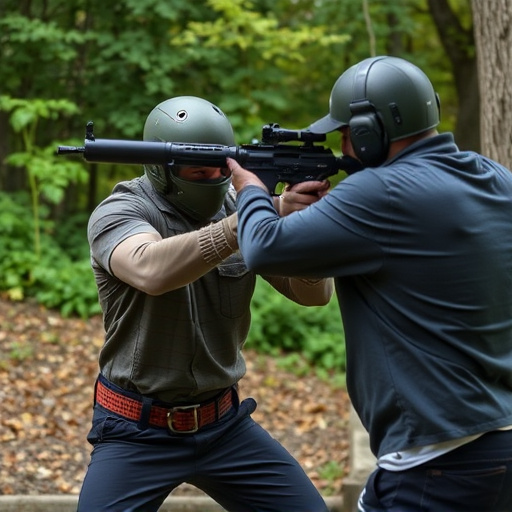
In the dynamic landscape of professional security, preparing guards for real-world scenarios is paramount to ensuring effective and safe operations. Training programs for security professionals often include a range of non-lethal weapon options, such as stun guns, pepper spray, and tasers, to equip them with versatile tools capable of de-escalating potential threats without resorting to lethal force. These training sessions are meticulously designed to simulate diverse situations, from physical altercations to high-stress environments, allowing guards to develop proficiency in using non-lethal weapons appropriately and responsibly.
The integration of stun guns into security guard training is a strategic move to enhance their capability to handle hazardous situations. Professional security guard stun gun certification programs emphasize the importance of understanding local laws and regulations, proper usage techniques, and risk assessment, ensuring that guards are well-prepared to respond effectively while adhering to legal and ethical standards. Through realistic simulations and practical exercises, these training sessions equip security professionals with the skills needed to navigate challenging situations, ultimately contributing to safer communities and enhanced security outcomes.
Benefits and Considerations for Security Guard Agencies
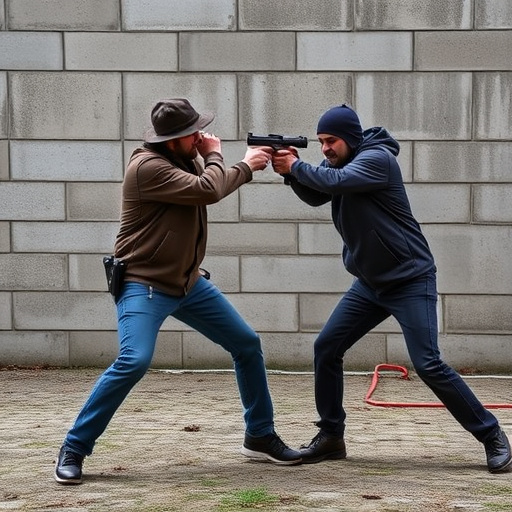
For security guard agencies, incorporating non-lethal weapon training and certifications offers a multitude of benefits. By equipping their personnel with tools like stun guns, agencies can enhance officer safety and reduce the risk of physical altercations escalating. Stun guns provide a powerful deterrent, allowing guards to incapacitate assailants without causing permanent harm, thereby fostering a safer environment for both employees and clients.
When considering non-lethal weapon training, security guard agencies must weigh various factors. These include budget allocation, legal requirements in their jurisdiction, and the specific needs of their operations. Proper training ensures that officers understand the safe and effective use of stun guns, adhering to legal guidelines and de-escalation techniques. This proactive approach not only improves job performance but also enhances public trust and satisfaction with security services.
Legal Aspects: Navigating Regulations for Non-Lethal Weapon Certification
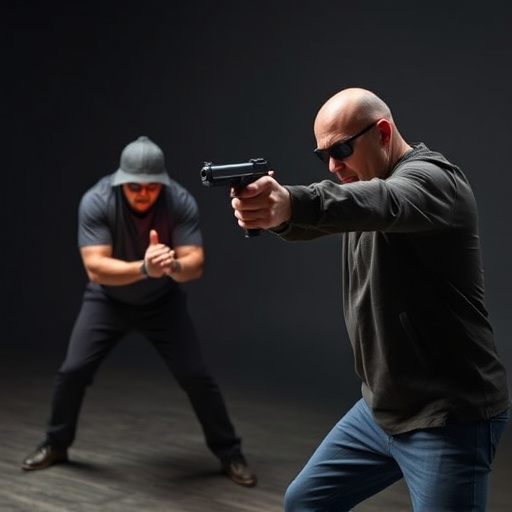
Navigating the legal landscape is a crucial step for individuals aspiring to obtain non-lethal weapon certification, particularly when it comes to professional security guard training involving stun guns. Each jurisdiction has its own set of regulations and guidelines governing the use and possession of these devices, ensuring public safety and accountability. Security guards armed with stun guns must understand and adhere to these laws to remain compliant and avoid legal repercussions.
The certification process typically involves rigorous training programs that educate candidates on the proper handling, deployment, and legal implications of non-lethal weapons. These courses equip security professionals with the knowledge to make informed decisions while de-escalating potentially dangerous situations. By adhering to local legislation, security guards can effectively utilize stun guns as a last resort, ensuring they remain tools for public safety rather than causes for harm or legal disputes.
Securing a non-lethal weapon certification is a vital step for professional security guard agencies looking to enhance their capabilities. By understanding non-lethal weapons, recognizing the role of stun guns in security, and participating in comprehensive training programs, guards can effectively navigate real-world scenarios while adhering to legal regulations. This certification process not only empowers security personnel but also ensures public safety, making it a crucial consideration for any reputable security guard agency.
